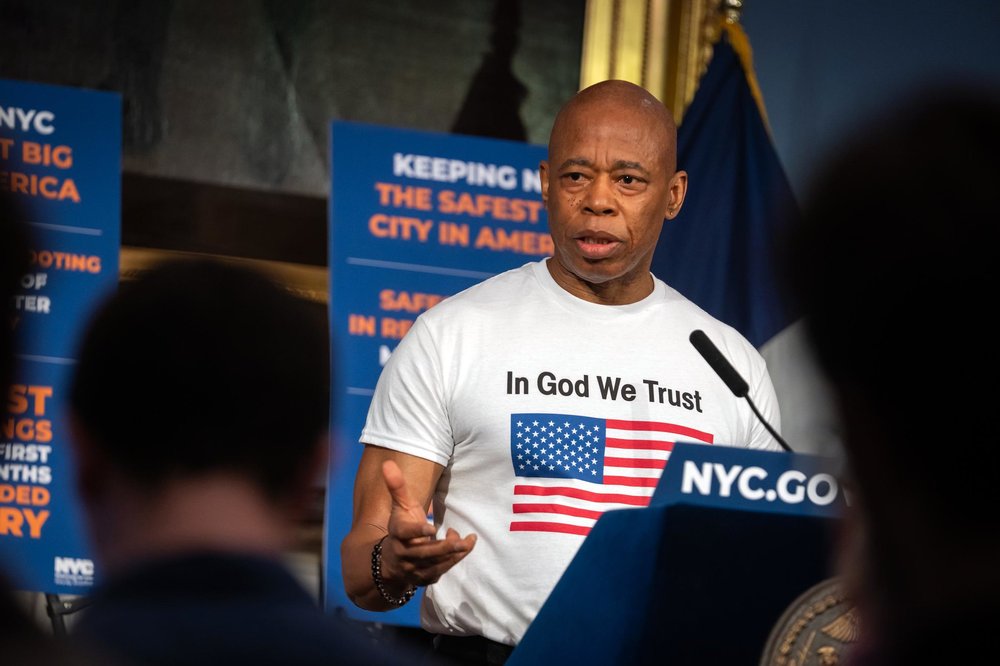Should NYC voters be able to remove Mayor Adams for misconduct?
April 9, 2025, 11:30 a.m.
A good government group is pitching a change to the City Charter that create a path for special removal elections in the city.

A good-government group is pitching a proposal following the corruption scandal that engulfed Mayor Eric Adams: Let voters participate in a special election to remove a future mayor from office.
The 125-year-old organization Citizens Union plans to present a proposal at a meeting of the Adams administration’s Charter Revision Commission on Wednesday that would create a new procedure to remove a mayor for misconduct. The chair of the nonpartisan group said New York City needs an option other than vesting the largely untested removal power solely with the governor.
“The clouds of corruption over City Hall, the indictments against Mayor Adams all have led us to a place where we are recognizing that there is no local mechanism to remove a mayor, except in the case of ineligibility, which is effectively an inability to do their job for physical reasons,” said John Avlon, the board chair of Citizens Union.
The plan comes one week after Manhattan federal Judge Dale Ho permanently dismissed charges alleging Adams accepted illegal straw donations and took official actions in exchange for travel perks from people with ties to the Turkish government. But in his ruling, Ho questioned the Department of Justice's argument that the charges should be dropped so Adams could cooperate with President Donald Trump’s immigration crackdown.
“Everything here smacks of a bargain: dismissal of the indictment in exchange for immigration policy concessions,” Ho wrote.
Under the proposal, the removal process would begin with a resolution in the City Council. That could ultimately lead to a special removal election where voters would decide the mayor’s fate.
New York is not among the 39 states that allow recall elections for local elected officials. However proponents cite the authority granted through the New York state constitution and the state’s Home Rule law, which allows local governments to determine the “mode of selection and removal” of local elected officials. The governor would still maintain removal authority, but the proposal is intended to offer the city an alternative.
The grounds for removal would be limited to a set of circumstances defined as “malfeasance, neglect of duty, violation of the oath of office, or a conviction of a felony regarding conduct in office.”
In those circumstances, the City Council could propose charges that would need to be adopted by 70% of the body, or 36 of its 51 members. If adopted, the Council would then hold a public hearing in which the mayor would be entitled to legal representation and could present evidence and call witnesses.
After the hearing, the Council would vote on whether to recommend removal, which would require an even higher 80% approval to pass. If approved, the question of whether to remove the mayor would go before voters in the special election. The entire process should last no more than 67 days, according to the proposal.
If the mayor were to be removed, the Charter’s current rules for succession would apply. The public advocate would become acting mayor, and the vacancy would be filled through a special election unless the mayor was removed less than 90 days before a regularly scheduled election.
“The important thing here is that we do not want to create disturbances in city government,” said Ben Weinberg, Citizens Union’s director of public policy.
The mayor’s current Charter Revision Commission was intended to focus largely on housing reforms, but its mandate includes reviewing all of the City Charter.
“This is an independent commission,” Commission Chair Richard Buery said at a hearing in late February. Buery is the head of the antipoverty Robin Hood Foundation and a former deputy mayor to Bill de Blasio, who helped successfully roll out the city’s universal pre-K program.
“In making our recommendation to the city's voters, we are bound only by our judgment and our values. We will pursue ideas regardless of who proposes them and regardless of who supports them,” he added.
This is the second Charter Revision Commission the mayor has convened. The bodies consider changes to the city charter, New York City’s version of a constitution, and puts proposals before voters for approval as ballot initiatives during general elections.
The commission Adams called last year recommended five ballot measures to amend the city charter, four of which passed despite being criticized as an effort to short-circuit the City Council. The mayor and the City Council both convened their new commissions in December, meaning two are running at the same time.
Weinberg said he hopes the mayor’s Commission will take up this issue and put a proposal before voters in November. But if not, he said there’s also the Council’s commission.
“We have two bites of the apple here,” Weinberg said.
Correction: Due to an editing error, this story previously misstated the status of the City Council's last attempted charter revision commission.
Judge permanently dismisses corruption charges against Mayor Adams